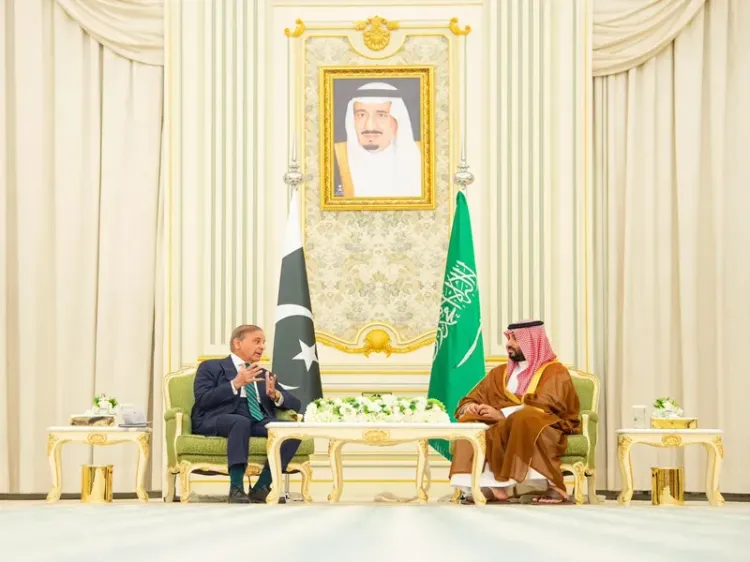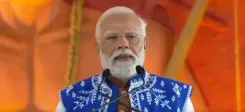Is the Saudi-Pakistan Pact the Dawn of an Arab NATO?

Synopsis
Key Takeaways
- Saudi Arabia and Pakistan formalize defense ties.
- Agreement reflects long-standing relations.
- Concerns raised in Egypt over regional implications.
- India cautious about potential threats.
- Uncertain future for Islamic military alliances.
New Delhi, Sep 28 (NationPress) On September 17, Saudi Arabia and Pakistan astonished the global community by unveiling their Strategic Mutual Defence Agreement. This much-discussed pact formalizes the principle of collective defense between these two Asian nations, meaning that any aggression against one will be viewed as aggression against both.
This concept may remind many of a similar clause (Article 5) in the North Atlantic Treaty Organisation (NATO), which asserts that an attack on one member state is considered an attack on all. So, does this signify the inception of a comparable military alliance dedicated to safeguarding the rights of Islamic nations? The answer is somewhat complex.
The connection between Riyadh and Islamabad is longstanding and not as superficial as commonly perceived. For decades, Saudi Arabia has acted as a benefactor.
It has provided loans, subsidized oil, and offered bailouts during Pakistan’s economic downturns. In return, Pakistan has stationed troops in the kingdom, trained its military, and quietly positioned itself as a potential nuclear safety net for Riyadh, should that need arise.
This religious camaraderie, as articulated by many Pakistanis, stems from Saudi Arabia’s role as the custodian of Islamic holy sites and Pakistan’s self-proclaimed identity as the “fortress of Islam.” Until now, this relationship has thrived informally, characterized by gestures of support, tacit understandings, and sporadic transfers of resources.
This agreement between Saudi Arabia and Pakistan formalizes the pre-existing ties; it transforms implicit fraternity into an explicit treaty, altering regional perceptions of their commitments.
For Pakistan, the agreement symbolizes a restoration of status and self-esteem, while for Saudi Arabia, it serves as a hedge, conveying a message of independence and assurance amidst a turbulent Gulf.
However, this development has not gone unnoticed throughout the Arab world. In Egypt, for example, it has sparked controversy, as many believe it undermines their own 2015 proposal for a unified Arab army, envisioned as an “Arab NATO.”
Egyptian analysts question why Saudi Arabia opted to sign a defense pact with Pakistan rather than Egypt itself or, ideally, bolster its own military capabilities.
The underlying frustration arises from Riyadh’s choice of Islamabad over Cairo, especially given Egypt’s long-standing aspirations to spearhead a pan-Arab security framework. The irony is glaring—Egypt, a US ally receiving nearly $1.3 billion annually in military aid, is already deeply entrenched in NATO-led security structures, actively collaborating with Western militaries through partnerships and joint exercises.
For Riyadh, Pakistan represents a less complicated and more reliable partner, one that has provided troops and advisors for decades, with 1,500–2,000 Pakistani personnel still stationed in Saudi Arabia today.
India’s response has been cautious thus far. The Ministry of External Affairs acknowledged that such discussions were anticipated and pledged to “study the implications carefully.” Retired diplomats have been more direct.
Former foreign secretary Kanwal Sibal labeled the pact a “grave misstep,” contending that it could embolden Pakistan, attract Saudi financing for its military, and shield Islamabad from repercussions in future crises.
Concerns in New Delhi are not confined to traditional conflict. If Pakistan perceives Riyadh’s support as diplomatic cover, it might feel emboldened to test India’s patience through cross-border provocations or proxy activities.
For Indian policymakers, the apprehension extends beyond the risk of security flare-ups. There’s an unsettling realization that years of patient diplomacy in the Gulf, establishing strong relationships with the UAE, Israel, and, more recently, Saudi Arabia, could begin to unravel if Riyadh’s inclination towards Pakistan escalates beyond mere symbolism.
The implications of this pact stretch far beyond South Asia. Israel may interpret the agreement through its own delicate balance with Riyadh and could be concerned that Saudi Arabia’s alignment with Pakistan complicates normalization prospects in the region.
Iran views this as a reinforcement of Sunni unity, countering its influence in the area. For larger powers like Washington and Beijing, it can be understood in two ways simultaneously: as an annoyance to current plans, but also as a new opportunity to extend their influence.
The United States, still the Gulf's primary security provider but increasingly cautious about over-commitment, must now grapple with a partner that signals its ability to establish independent military assurances. In contrast, China stands to gain.
As Pakistan’s “all-weather” ally and a burgeoning investor in Saudi Arabia’s Vision 2030 initiatives, Beijing is poised to utilize this alignment to expand its footprint and potentially diminish India’s influence. Consequently, this pact transcends a mere bilateral agreement: it introduces fresh variables into the strategic calculations of every significant regional and global actor.
What remains somewhat ambiguous are the specific terms of the agreement. The term “aggression” itself is subject to interpretation. Does it encompass cyberattacks, terrorism by non-state actors, or solely conventional military invasions?
Would proxy violence against Saudi targets in Pakistan be sufficient to activate obligations? This ambiguity poses risks on both sides. On one hand, it provides Riyadh the leeway to reassure New Delhi that economic and political cooperation remains unscathed; on the other hand, it heightens the dangers of misinterpretation and miscalculation.
Whether this advancement will catalyze the formation of an Islamic NATO remains uncertain. However, it has undeniably sparked discussions surrounding it. If we take a step back, we can trace its origins to September 9, the day Israel launched an attack on Qatar’s capital, Doha.
This Israeli strike, which resulted in the deaths of five low-ranking Hamas members and a Qatari security official, underscored the reality that Israel can and will target anyone it perceives as a threat to its national security.
This unexpected aggression rattled Middle Eastern nations, as Doha, previously regarded as a safe haven and mediator in both regional and global disputes, bore the brunt of Israeli hostility.
Israeli officials asserted that PM Benjamin Netanyahu had informed US President Donald Trump an hour prior to the strikes, a claim denied by the White House. According to the White House, as soon as Trump was informed about the strikes, he immediately directed his Special Envoy Steve Witkoff to notify Qatar. This raises the question of how Israel could strike a US ally like Qatar without prior consultation.
To clarify Qatar's significance to the US, it hosts the largest military base in the region for the latter, and the audacity with which Israel attacked its capital was unprecedented.
Qatar, which had previously gifted US President Donald Trump a $400 million jet in May, found itself in a precarious position regarding its relationship with the US, especially after investing significant resources in nurturing its ties with Trump in recent years.
Qatar has undergone significant transformation since June 2017, when Trump characterized it as a nation historically financing terrorism at a high level.
The concept of an Islamic NATO presents an opportunity for Muslim nations in the region to ensure their security against any aggression (primarily from Israel), especially as America’s role as a security guarantor loses its former significance.
For the Muslim world, this could serve as a potential platform, even if symbolic, to demonstrate solidarity and mutual defense amid rising Israeli aggression and diminishing US influence. For any alliance to succeed, there must be a singular unifying identity and a common adversary; the idea of an Islamic NATO meets both criteria.
Their shared religion, Islam, and mutual animosity towards Israel qualify them in this regard. However, this does not guarantee the alliance’s effectiveness, nor does it address the internal rivalries among Islamic nations that challenge its formation and functionality.
For instance, Iran is unlikely to align with Saudi Arabia or Pakistan due to its strained relations with both. Turkey, another significant player, pursues an independent foreign policy that often conflicts with Riyadh’s vision and, notably, is also an active NATO member.
Whether this pact evolves into a sustainable alliance, remains merely a rhetorical device, or becomes a flashpoint for future crises will depend not on the text itself but on the actions of its signatories and their neighboring states.
(The writer is a political strategist with expertise in media relations and geopolitical developments)









